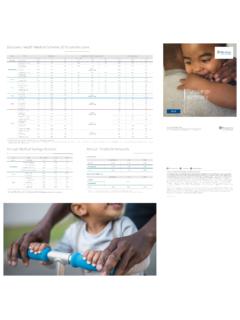Transcription of report Jamaica 04 08 09 mgm formatted - WHO | …
1 WHO-AIMS report ON MENTAL health SYSTEM IN Jamaica MINISTRY OF health Jamaica WHO-AIMS report ON MENTAL health SYSTEM IN Jamaica A report of the assessment of the mental health system in Jamaica using the world health organization - Assessment Instrument for Mental health Systems (WHO-AIMS). Kingston, Jamaica 2009 Ministry of health Jamaica WHO, Country office in Jamaica Panamerican health organization (PAHO/WHO) WHO Department of Mental health and Substance Abuse (MSD) 3 This publication has been produced by the WHO, (Country Office) in collaboration with WHO, (Regional Office) and WHO, Headquarters. At WHO Headquarters this work has been supported by the Evidence and Research Team of the Department of Mental health and Substance Abuse, Cluster of Noncommunicable Diseases and Mental health .
2 For further information and feedback, please contact: 1) Earl Wright, e-mail: 2) Jean Marie Rwangabwoba, e-mail: 3) Shekhar Saxena, WHO Headquarters, e-mail: (ISBN) world health organization 2009 Suggested citation: WHO-AIMS report on Mental health System in Jamaica , WHO and Ministry of health , Kingston, Jamaica , 2006. (Copyright text as per rules of the Country Office) 4 Acknowledgement The world health organization Assessment Instrument for Mental health Systems (WHO-AIMS) was used to collect information on the mental health system of Jamaica . The project in Jamaica was implemented by Dr Earl Wright, Director Mental health & Substance Abuse services, Mrs. Michelle Richards Henry, Programme Development Officer Mental health , Mrs.
3 Carol Baker Burke, National Coordinator Mental health . Appreciation is also extended to Dr Wendel Abel Head of Psychiatry, Department of Community health & Psychiatry, Medical Records Clerk at Bellevue Hospital and the Mental health Team island wide. The project was supported by the PAHO/WHO Representation in Jamaica and by the PAHO/WHO Regional Office Mental health team. The world health organization Assessment Instrument for Mental health Systems (WHO-AIMS) has been conceptualized and developed by the Mental health Evidence and Research team (MER) of the Department of Mental health and Substance Abuse (MSD), world health organization (WHO), Geneva, in collaboration with colleagues inside and outside of WHO. Please refer to WHO-AIMS (WHO, 2005) for full information on the development of WHO-AIMS at the following website.
4 The project received financial assistance and/or seconded personnel from: The National Institute of Mental health (NIMH) (under the National Institutes of health ) and the Center for Mental health Services (under the Substance Abuse and Mental health Services Administration [SAMHSA]) of the United States; The health Authority of Regione Lombardia, Italy; The Ministry of Public health of Belgium and The Institute of Neurosciences Mental health and Addiction, Canadian Institutes of health Research. The WHO-AIMS team at WHO Headquarters includes: Benedetto Saraceno, Shekhar Saxena, Tom Barrett, Antonio Lora, Mark van Ommeren, Jodi Morris, Anna Maria Berrino and Grazia Motturi. Additional assistance has been provided by Alexander Kopp and Mona Sharma.
5 The WHO-AIMS project is coordinated by Shekhar Saxena. 5 Executive Summary The world health organization Assessment Instrument for Mental health Systems (WHO-AIMS) was used to collect information on the mental health system in Jamaica . The goal of collecting this information is to improve the mental health system and to provide a baseline for monitoring the change. This will enable Jamaica to develop information-based mental health plans with clear base-line information and targets. It will also be useful to monitor progress in implementing reform policies, providing community services, and involving users, families and other stakeholders in mental health promotion, prevention, care and rehabilitation.
6 Jamaica 's Mental health Policy was last revised in 1997 and is currently inadequate and requires revision and upgrading to include critical components such as human resources and human rights issues to name a few. The Mental health Unit has the revision and upgrading of this policy as an activity on its' 2009/10 workplan. The Strategic Plan for the years 2001 2006, which is 65% implemented is in the process of being reviewed and updated for the years 2009-2014. The 2001-2006 strategic plan was not fully implemented because of budgetary constraint. The Mental health Law was last revised in 1997 and is also on the Mental health Unit's 2009/10 work plan to be reviewed and revised to include all human rights policies as a critical component. The restructuring of the financing of the service is in the Mental health Plan which has been approved by Cabinet.
7 With the change in Government, however, the Mental health team will now have to advise the new Minister of health and make the necessary arrangement for the issue of the redistribution of funding from the costly mental hospital to the community mental health services to support patient care as near as possible to the community in which they live, to be made into policy and implemented. This activity is also on the unit's 2009/10 workplan. The mental health service is divided into national and regional health authorities. Mental health is integrated into general health care with all regions having most of the essential mental health components and psychotropic medication. A major weakness of the service is the child and adolescent and forensic component of the service.
8 Most patients are treated in the outpatient community facilities at a rate of 1034 per 100,000 population. These facilities exist throughout the island in the various communities, as part of primary health care. In Jamaica epidemiological studies show that the most prevalent disorder is that of Major Depressive Disorder. However, schizophrenia is the most prevalent disorder diagnosed and treated. There is one mental hospital in the country with a bed capacity of 32 beds per 100,000 population. The number of beds in the mental hospital has decreased by 23% in the last 5 years. The patients admitted to the mental hospital are 6diagnosed primarily with schizophrenia 79% and most admissions are involuntary. The average days spent in the mental hospital is 280 days.
9 The average length of stay the acute ward is 25 days. Long stay patients account for the majority of the days spent and should be in a residential support living type facility which currently is underserved. The majority of clinics have mental health assessment and treatment protocols and 78% of the primary health care staff have had refresher training in mental health in the last year. The majority of clinical services are provided by nurses, which represents 6 per 100,000 under the supervision of the psychiatrists which is 1 per 100,000. There is a dearth of psychologists, social workers and occupational therapists in the island due to the unattractive remuneration in the public sector. Most psychiatrists provide both public and private services.
10 While few psychiatrists emigrate to other countries, a significant number of nurses emigrate on a yearly basis. Consumers, non-government, community based and family associations interact closely with the mental health services. Mental health Education and Promotion is a stated priority for both the national and regional authorities. During the last two years there has been an active mental health promotion targeting all sectors, including primary and secondary schools. There is no legislative, financial provision for persons with mental disorders and only 1% of persons with a mental disability receive social welfare benefits. 7 Introduction Jamaica is an island nation of the Greater Antilles, 234 kilometres (145 miles) in length and as much as 80 kilometres (50 miles) in width situated in the Caribbean Sea.

















